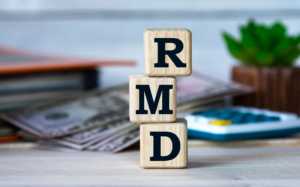Required Minimum Distributions and Charitable Giving
November 4, 2022
To Inform:

The onset of Autumn is a reminder for many things, cooler days and brisk nights, football, the forthcoming holiday season, and Required Minimum Distributions. Ha!
What is a Required Minimum Distribution?
A Required Minimum Distribution, often abbreviated as RMD, is the minimum annual amount you must take from retirement accounts to satisfy federal tax rules once you reach age 72 (or 70.5 if you were born before July 1, 1949). The amount is a function of your age, associated life expectancy factor, and the prior year-end account balance. RMDs are treated as ordinary income for tax purposes.
What types of retirement plans require minimum distributions?
Required minimum distributions apply to Traditional IRAs, IRA-based plans such as SEPs and Simple IRAs, as well as employer sponsored plans including profit-sharing plans, 401(k) plans, 403(b) plans, and 457(b) plans.
There are limitations to consider, but some people who are still working after age 72 can delay RMDs from their employer sponsored plan until retirement. Roth IRAs that are not inherited are exempt from RMDs. Inherited IRAs, including Inherited Roth IRAs, are subject to RMDs and subject to their own set of rules determined by the SECURE Act passed in late 2019.
Common questions surrounding RMDS
- Do I have to spend it?
-
No, IRS rules only necessitate that individuals withdraw the required amount and pay the associated income tax. RMDs are often used to cover living expenses, such as travel or healthcare, but can be saved in a brokerage or bank account.
-
- Can I transfer the dollars directly into a Roth IRA?
-
Unfortunately, no, your annual RMD can’t be satisfied with a Roth conversion. Roth conversions are allowed for any dollars in excess of the RMD.
-
- What if I don’t take my RMD?
-
The penalty for not taking an RMD is a 50 percent excise tax on the amount not distributed.
-
RMDs and Charitable Giving
The Joseph Group is blessed to work with clients who are eager to financially support the organizations and causes that resonate with them. And luckily, our tax code allows charitably minded IRA owners aged 70.5 and older to give in a tax efficient manner through Qualified Charitable Distributions.
What is a Qualified Charitable Distribution (QCD)?
A QCD allows the donor (IRA owner) to make an otherwise taxable distribution from their IRA directly to recognized 501(c)(3) charitable organizations that are eligible to receive tax-deductible contributions.
The QCD may be used to cover all or a portion of your RMD, and the donated amount is excluded from taxable income. A QCD is best for those who take the standard deduction, as it allows you a way to reduce your adjusted gross income without requiring itemized deductions to capture charitable contributions.
There are items to consider when making a QCD.
- You must be at least 70.5 years of age or older
- The funds must be paid directly to the qualified charity. Funds distributed to you and then given to the charity do not qualify as QCD
- For a QCD to count towards your current year’s RMD, the funds must be distributed from the IRA by December 31st — Any amount donated above your RMD does not count towards satisfying a future year’s RMD
-
The maximum annual amount that can qualify for a QCD is $100,000, which applies to the sum of QCDs made to one or more charities through the year
- Your 1099-R will report the QCD as a normal IRA distribution, so it is important to let your tax preparer know of completed gifts
- QCDs can only be made from IRAs, other retirement accounts (i.e., 401k plan) are not eligible
Questions about your Required Minimum Distribution? Interested in learning more about Qualified Charitable Distributions? Reach out to a member of your team at the Joseph Group, we are here to assist you!

Written by Matt Zimmermann, Client Advisor